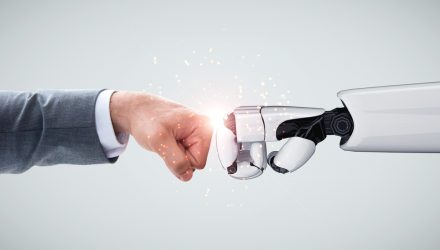First, it was industrial robots. Now, amid the advancements made by ChatGPT and rival products, there’s growing concern that the ongoing artificial intelligence (AI) and automation revolution will be a jobs killer.
Indeed, ChatGPT’s ability to churn out low-cost prose in short order may be sending chills across the professional writers community, but the technology is far from perfect. For now, journalism appears safe from AI intrusion. Still, there are investment implications — many of which are relevant to assets such as the ARK Autonomous Technology & Robotics ETF (ARKQ).
Up 16% year-to-date, the actively managed ARKQ is proving its worth at a time of heightened interest in AI/automation investing. ARKQ is accomplishing that feat with no exposure to Microsoft (NASDAQ: MSFT), which is a major investor in ChatGPT, and just a 2.15% allocation to Alphabet (NASDAQ: GOOG) — the company behind ChatGPT rival Bard. Additionally, ARKQ is delivering this year without AI forcing major job attrition.
“At the mention of automation, businesses and consumers respond both with excitement about the potential for massive productivity gains and with fear of massive unemployment,” said Sam Korus, analyst at ARK Investment Management. “This (last) week, OpenAI, OpenResearch, and the University of Pennsylvania released new research about the impact on labor markets of large language models (LLMs) like ChatGPT. The high-level findings are that ‘80% of the U.S. workforce could have at least 10% of their work tasks affected by the introduction of LLMs, while approximately 19% of workers may see at least 50% of their tasks impacted.’”
As noted above, AI is often thought of as a jobs killer, but that’s not the intent of this disruptive technology. Rather, the AI/automation revolution is, at the corporate level, rooted in enhancing efficiencies. A more efficient company doesn’t necessarily need to trim headcount to get there.
In fact, more productive workers can not only drive higher profitability for their employers, but also drive wage growth as well. Additionally, as AI and automation mature, those concepts can have a deflationary impact, meaning they can drive production costs lower. Companies can pass savings onto consumers, meaning that purchasing power increases.
Bottom line: AI has employment benefits, including more efficiencies and the potential for moving workers out of menial roles into something more substantial.
“ARK’s research suggests that technology will not increase unemployment but will displace employment associated with monotonous or menial tasks. Historically, while automation tools have created more jobs than they have displaced over time, they also have created the need for retraining as automation has transformed occupations,” concluded Korus.
For more news, information, and analysis, visit the Disruptive Technology Channel.
The opinions and forecasts expressed herein are solely those of Tom Lydon, and may not actually come to pass. Information on this site should not be used or construed as an offer to sell, a solicitation of an offer to buy, or a recommendation for any product.

